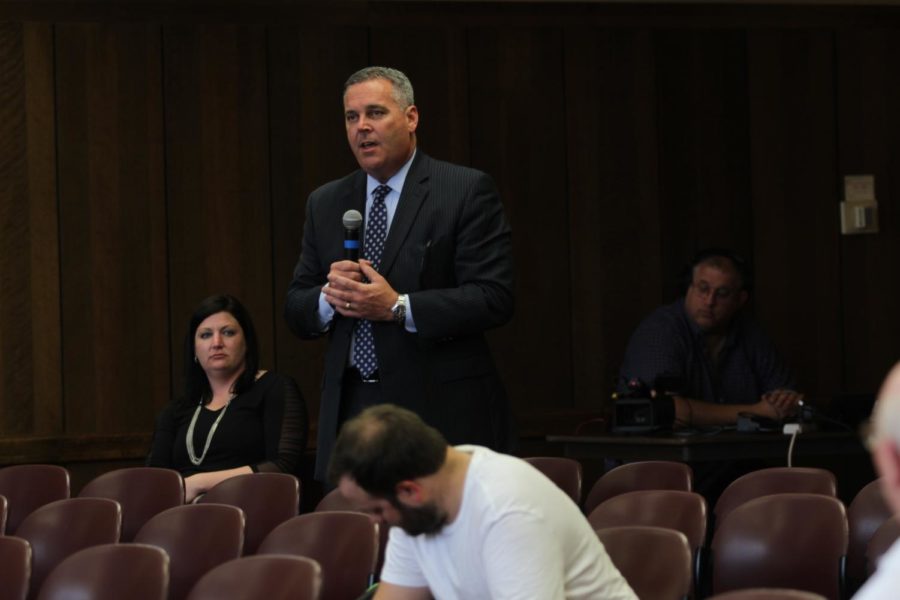- News
- News / Politics And Administration
- News / Politics And Administration / Campus
- News / Politics And Administration / City
- News / Politics And Administration / State
Ames Chamber of Commerce joins state business leaders in supporting comprehensive immigration reform
Dan Culhane, president of the Ames Chamber of Commerce, said that the ties Iowa State has to the Ames and Central Iowa community economies is important.
February 28, 2019
The Ames Chamber of Commerce has joined business leaders from across the state to request lawmakers sign “common sense” immigration reform at the federal level in an effort to reinvigorate Iowa’s economy.
Recognized as the “Iowa Compact on Immigration,” the compact supports bipartisan immigration policy that “ensures our federal system meets the needs of our employers and labor market.”
The compact requests that Iowa’s immigration policies “reflect and reaffirm our global reputation as a welcoming, hospitable and business-friendly state.”
With 40 signatures total, the compact includes support from Ames and Iowa State leaders such as Dan Culhane, president of the Ames Chamber of Commerce; David Peters, sociologist at Iowa State University; Joydeep Bhattacharya, economist at Iowa State; and Peter Orazem, economist at Iowa State and former city council member.
“This really is an awareness campaign at a minimum,” Culhane said. “I think oftentimes people don’t stop and think that organizations like ours would be strong proponents and advocates for immigration, but we are and we have been for a long time.”
The compact is based off six pillars that the signatories hope federal lawmakers adopt to help guide the immigration discussion. These pillars include: federal responsibility, strengthening the economy and workforce, a common-sense approach, effective enforcement, family and competitive communities.
The initiative was created by New York-based New American Economy, a bipartisan research and advocacy organization. The group has worked previously with the Ames Chamber of Commerce to highlight data that recognizes the impact immigrants have in the community.
For instance, a report by New American Economy suggests that in 2015 when 4,041 international students were enrolled at the university, they supported 1,303 local jobs and contributed $109.6 million to the economy.
This unique impact allows Ames to position itself as a leader in immigration reform in the state due to the nature of being a college town that consistently brings in international students, faculty and staff.
“The university is an employer and they need to attract people to work there,” Culhane said. “The more diverse the faculty and employment base is at Iowa State University, the better it represents the students they serve.”
Drew Kamp, director of public policy and business development for the Ames Chamber of Commerce, said after signing the compact an area that they hope to touch on more with lawmakers is the h1b visa process.
“We have actual numbers that show in 2016, there was 230,000 h1b visa applicants for 5,000 possible visas being granted,” Kamp said. “Every year there is always well over double the applicants for the amount they have.”
According to data compiled by the New American Economy — a bipartisan research and advocacy organization — an expansion of the h1b visa program could lead to the creation of 3,200 jobs in Iowa by 2020, Kamp said.
“That’s one that we really look at because there are a lot of companies that need some of that talent and it’s always something that is highly competitive. Like I said, there is always an overage compared to how many they can actually give out,” Kamp said.
As for now, Kamp hopes that the compact will not just highlight Ames’ dedication to immigration, but also build momentum and cohesion throughout the state to push the issue forward to lawmakers.
“It’s not about border security in Ames, Iowa,” Culhane said. “It’s about talent. It’s about enriching our community with diversity.”
Culhane hopes that people recognize that while the chamber focuses on economic and community development, they are also “mindful that this is a high priority for our community and our state and it’s good for our community and state.”

















